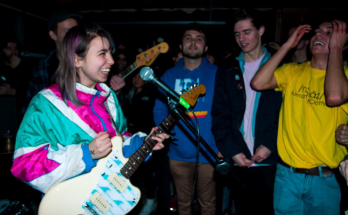Lou Barlow
Emoh
Merge
With his hand in so many pies over the years it’s hard to remember what is and what is not a side project for Lou Barlow. At 39, with more bands than most groups have albums, Barlow has come around to release his first official solo album.
As a lo-fi indie icon, Barlow has become legendary through his distorted homemade recordings. This project, however, comes out somewhat polished. The album does feature accompaniment from some of this past bandmates, but every song can be reduced to Barlow, his guitar and his four track recorder-except the eight tracks that were produced in a studio and evidently painstakingly mastered to make them sound like they weren’t. Seriously though, some were and some weren’t professionally done, but I had to read about it before I realized it. The production additions seem to hover somewhere behind the image you get of Barlow sitting on the edge of his chair with his guitar.
The point is Emoh is pure Barlow. It’s easily accessible folk music, a product of a songwriter and his guitar. It’s like a friend of yours asking you to listen to the song he just wrote. But this time you genuinely like it. Barlow’s songs come across homey and comfortable. Emoh, after all, is Home spelled backward. There is no documentation to verify if that was his intent, but the cover art does depict a rocket-powered house.
None of his lyrics really stand out as all that memorable. But that’s not really the point of the songs. You’re likely to take a more general memory of the song. Most of the songs concern relationships and tend to lose themselves in one another. Songs “Mary” and “The Ballad of Daykitty” distinguish themselves the most. In “Mary” Barlow strays from his more traditional songwriting formula and describes the mother of the messiah as an adulteress with an elaborate cover-up rather than a divine conception. “Daykitty” is a story about the adoption of his cat. His feline ballad rounds out the 14-track album and gives you the feeling Barlow is running out of material. You can look at it any way you want, but there’s no question that it’s actually about his hungry cat.
“Holding Back the Year” starts off the album strong with guitars and light bongos in the background. In “Caterpillar Girl,” another highlight, Barlow compares his object of affection to a caterpillar going through metamorphosis. “Royalty” offers the most stirring ballad among a collection of mostly laid-back, contemplative songs. These may be his best, but there really isn’t much drop-off over the course of the album, that is, until you get to the cat song.
Emoh should be listened to alone for the most part. Play it on your lone drive across the Great Plains or maybe indoors on a rainy day.



